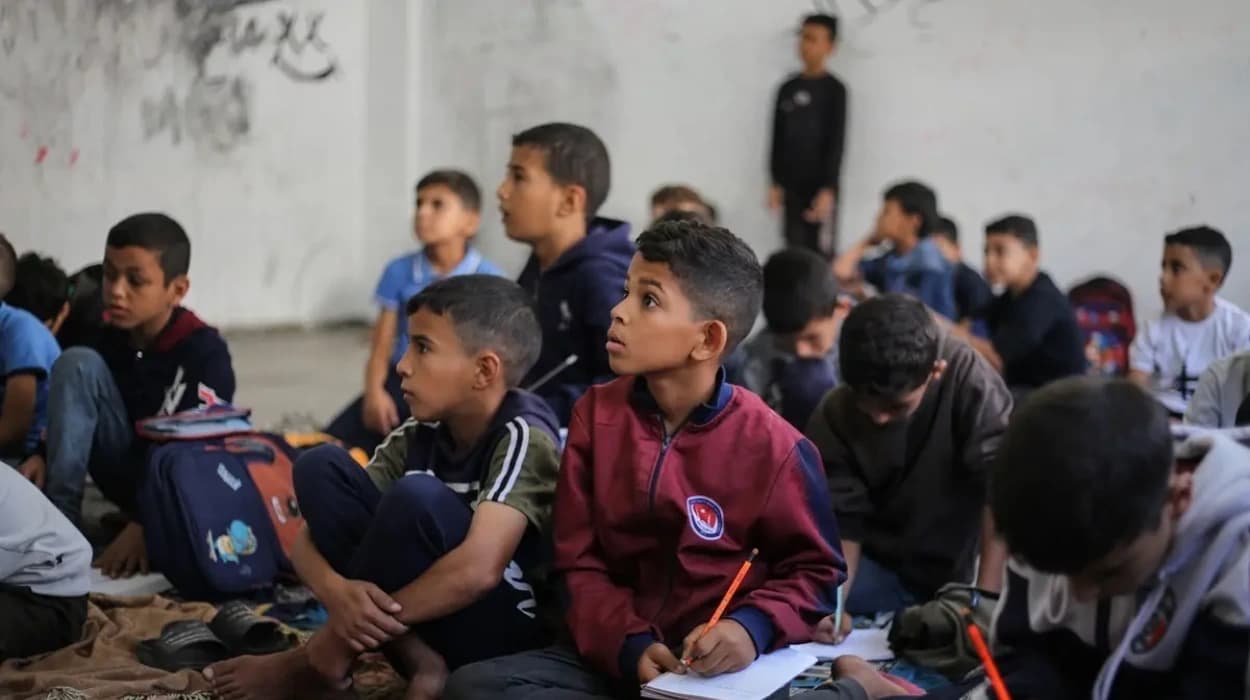Following the ceasefire in Gaza, over 25,000 children have resumed in-person learning in temporary classrooms, while around 300,000 continue their studies online as schools begin reopening amid widespread damage. The UN agency for Palestinian refugees (UNRWA) leads these educational efforts, aiming to restore normalcy for children affected by two years of war and displacement.
Schools Reopen Amidst Widespread Damage
The UN agency for Palestinian refugees, UNRWA, announced this week that schools in Gaza are reopening following the recent ceasefire between Israel and Hamas. Philippe Lazzarini, UNRWA Chief Commissioner-General, stated on the social media platform X (formerly Twitter) that
"more than 25,000 schoolchildren had already joined the agency’s 'temporary learning spaces,' while some 300,000 would continue their education through online classes."
At Al Hassaina school in western Nuseirat, central Gaza
Strip, classes have resumed despite a shortage of classrooms and furniture. The
school building, which had served as a shelter for dozens of displaced families
during the conflict, still bears the signs of that time, with laundry lines
strung across its three floors.
The Children's Perspective: Lost Years and Hope for Normalcy
Eleven-year-old Warda Radwan, a sixth grader attending Al Hassaina school, expressed both hope and hardship.
"I lost two years of schooling because of displacement and the war,"
she told AFP. Yet now, she
is eager to return to a learning routine.
In the school's courtyard, girls participate in morning
assembly exercises and chant “Long live Palestine!” before entering classrooms
where up to 50 students sit crowded on the floor, many without desks or chairs.
Jenin Abu Jarad, a relative of one student, shared her relief at the reopening of schools. She said,
"Since October 7 , there has been no schooling. The children only fetched water or played in the streets. Thankfully, classes are finally resuming."
UNRWA's Return to Learning Programme
UNRWA is expanding its "Return to Learning"
programme in Gaza, offering a mix of in-person learning at temporary or
repaired facilities and online classes to reach as many students as possible
during the rebuilding phase. Commissioner-General Philippe Lazzarini emphasised
these efforts as critical for restoring some normalcy to children's education
after two years of intense conflict.
Schools such as the Deir al-Balah Joint Elementary School
still carry scars of their recent use as shelters for displaced families, with
tents in the schoolyard and signs of damage inside classrooms. Despite this,
students like Sham Al-Abd and Asil Al-Loh express determination to learn and
play again and follow a curriculum including Arabic, English, and mathematics.
Education System Challenges and International Support
The educational infrastructure in Gaza suffered severe
damage during the conflict, with over 500 out of 564 schools affected. Many
schools require extensive repairs, and shortages of teachers and resources
remain a significant barrier to return to full educational capacity.
International organisations have begun programmes to rebuild
schools, provide teacher training, and offer psychological support to children
traumatized by years of war and displacement. Experts caution that long-term
educational recovery is contingent on sustained humanitarian aid and security
guarantees for the region.
Symbol of Hope and Resilience
For Gaza’s children, returning to school is more than an
academic milestone; it represents a symbol of peace, stability, and hope for
the future. Despite overcrowded classrooms, lacking basic furniture and
supplies, their enthusiasm to resume education shines through, as they reclaim
a semblance of the lives disrupted by conflict.
As captured by reporters from AFP at various locations in Gaza, including the Al Hassaina school and shelters-turned-classrooms, the resilience of Gaza’s children and the support from UNRWA stand as pivotal elements in the gradual recovery of Gaza’s education system.
Alongside educational efforts, Hamas has announced the release of three Israeli captives as part of a hostage-prisoner exchange under the ceasefire, a development signalling some progress in the fragile peace process.
UNRWA and other humanitarian agencies continue to monitor the situation closely, aiming to expand access to education and basic services as conditions permit in Gaza’s recovering post-conflict environment.
